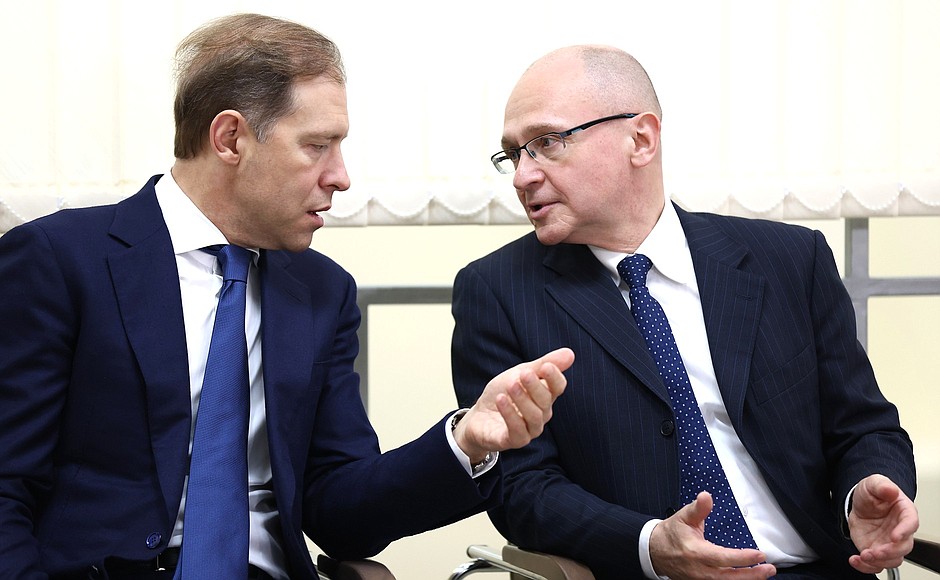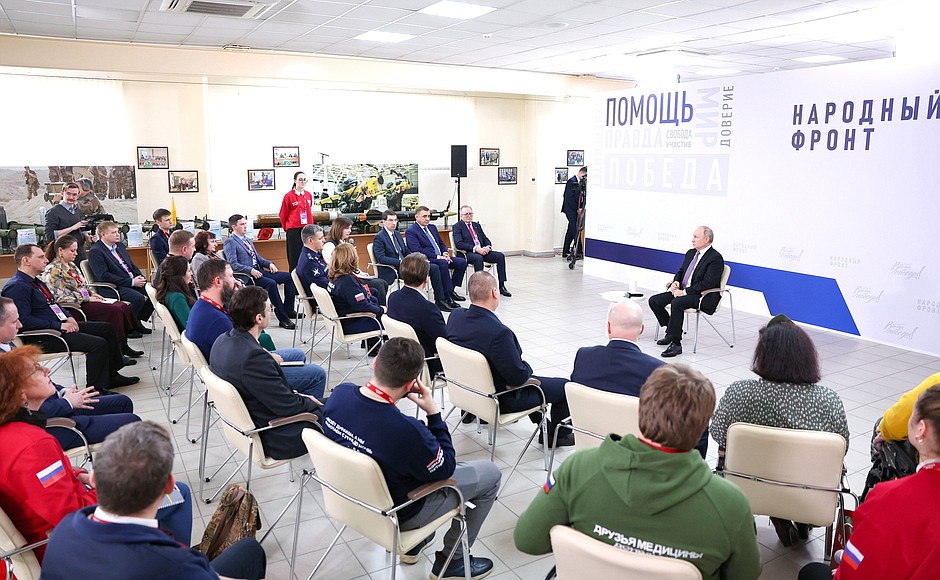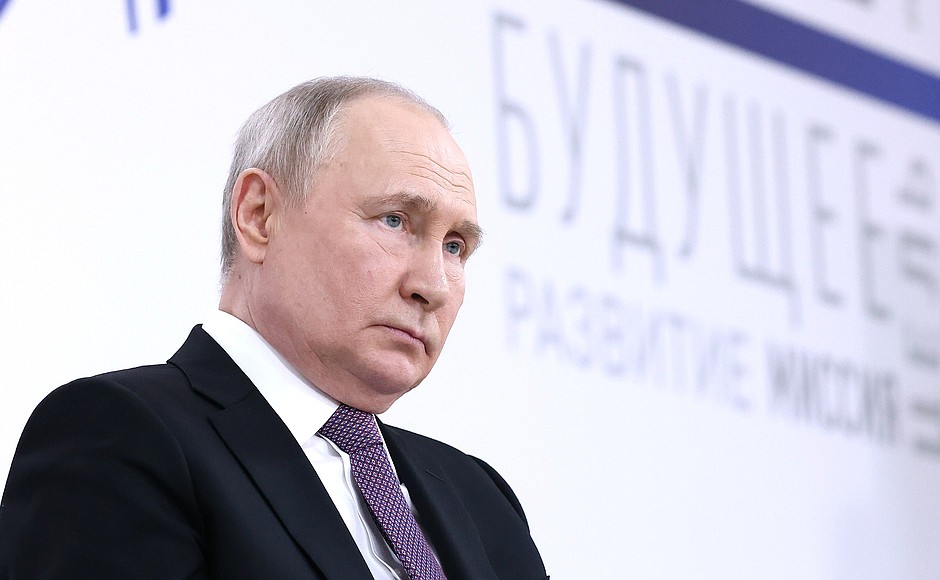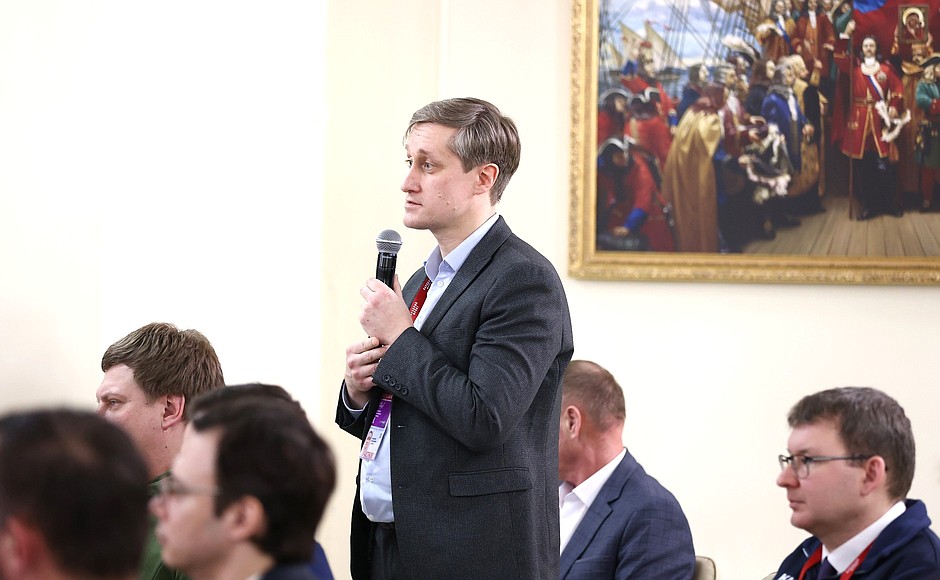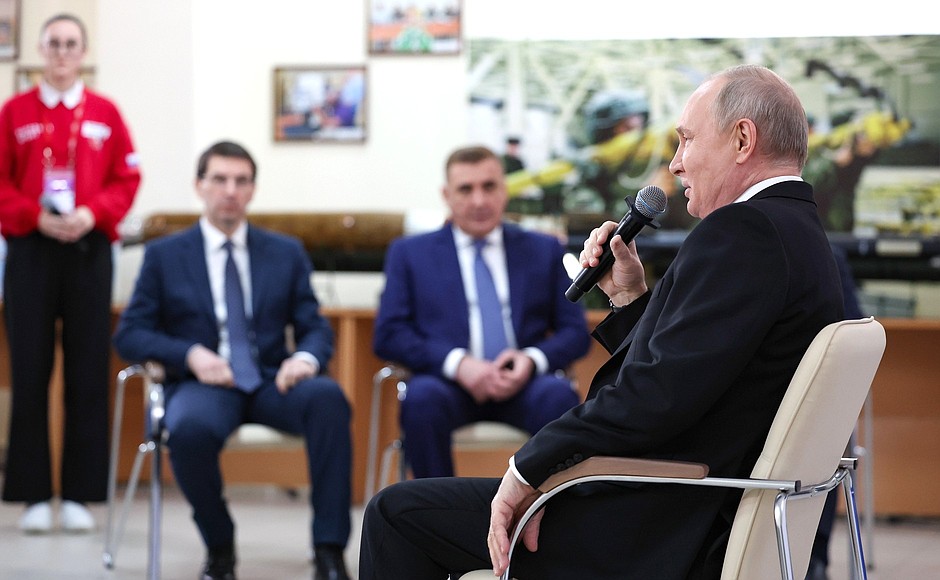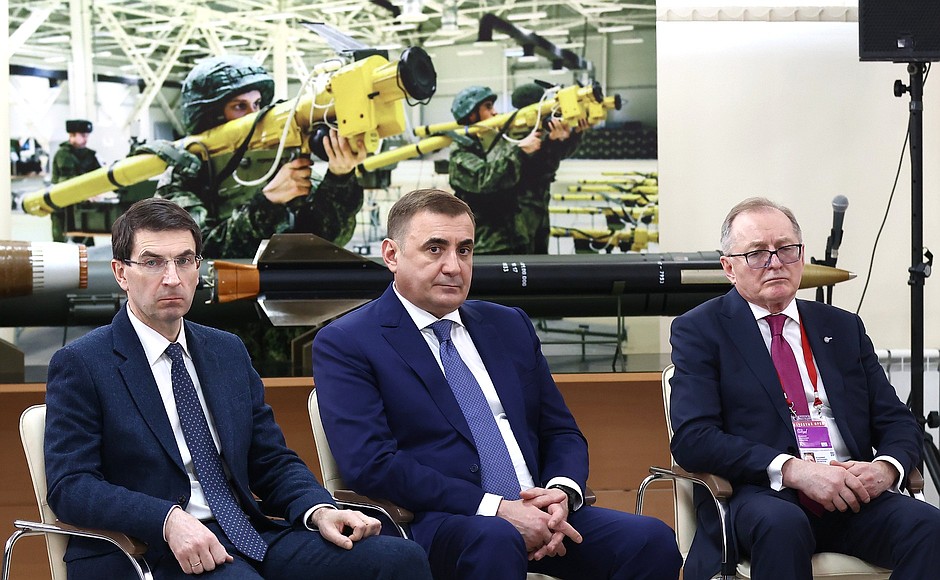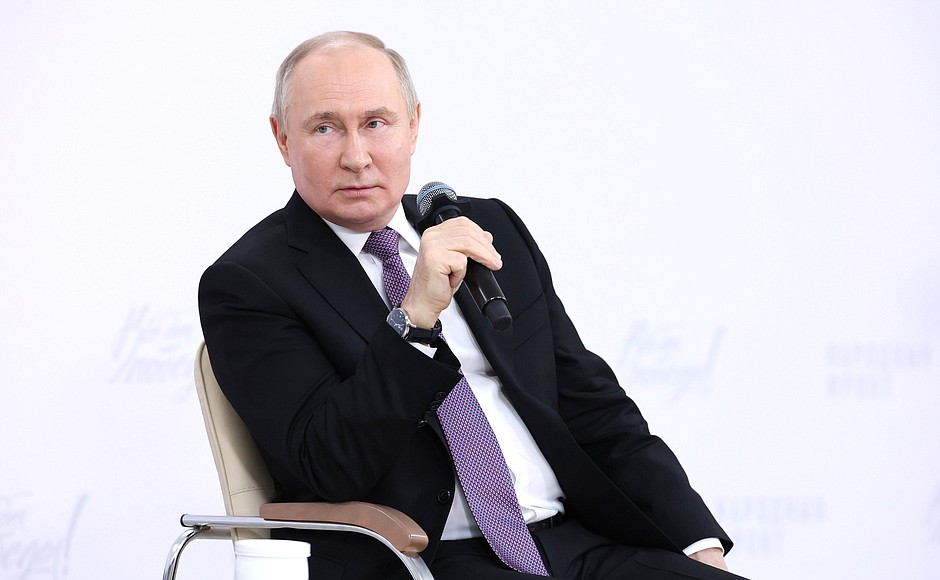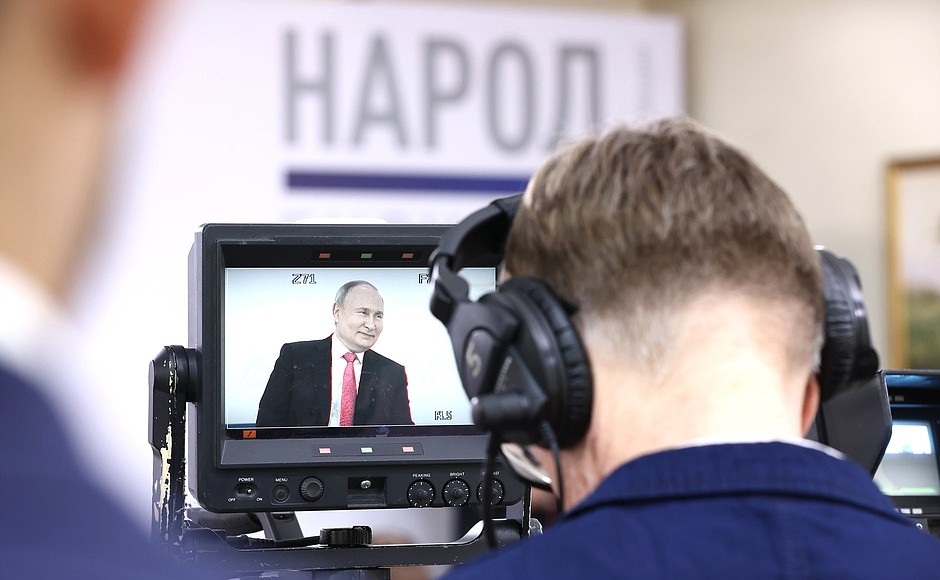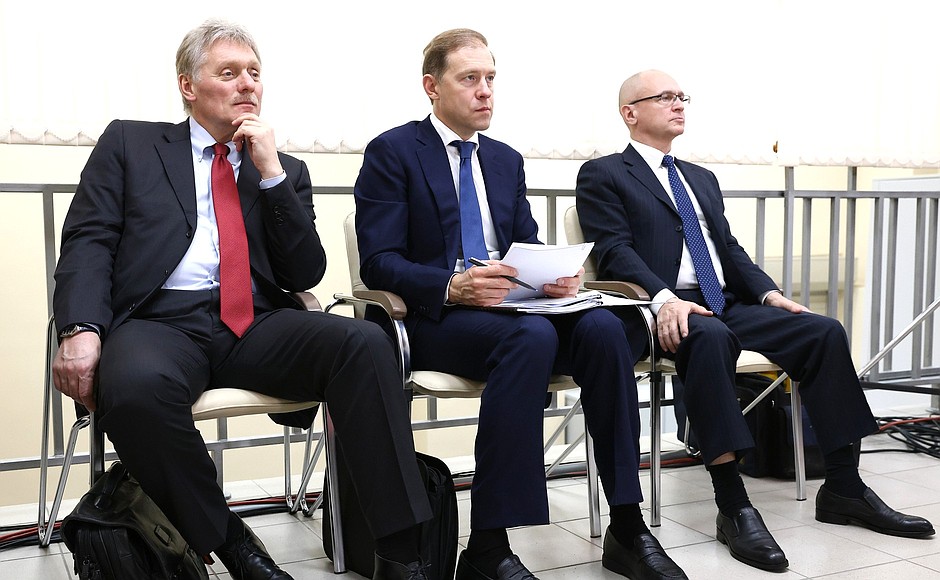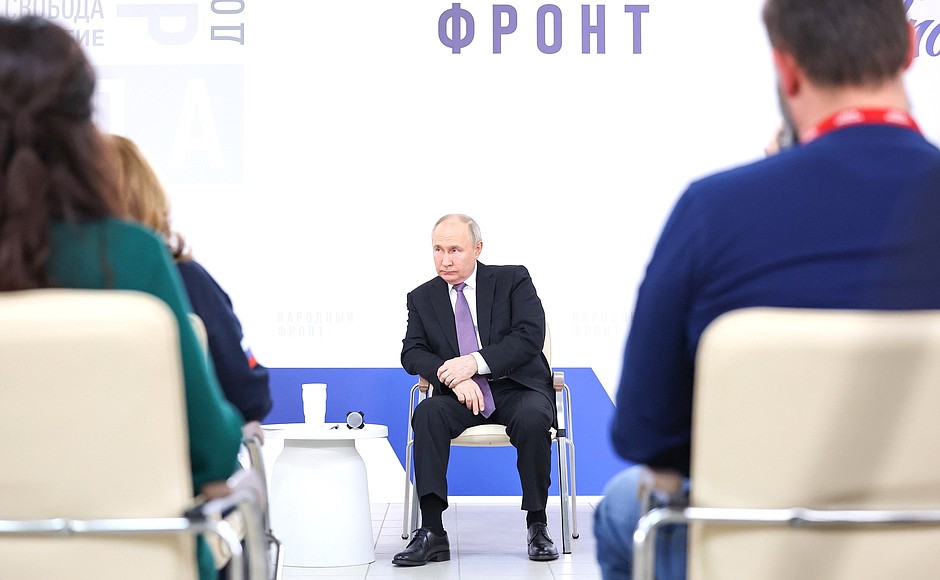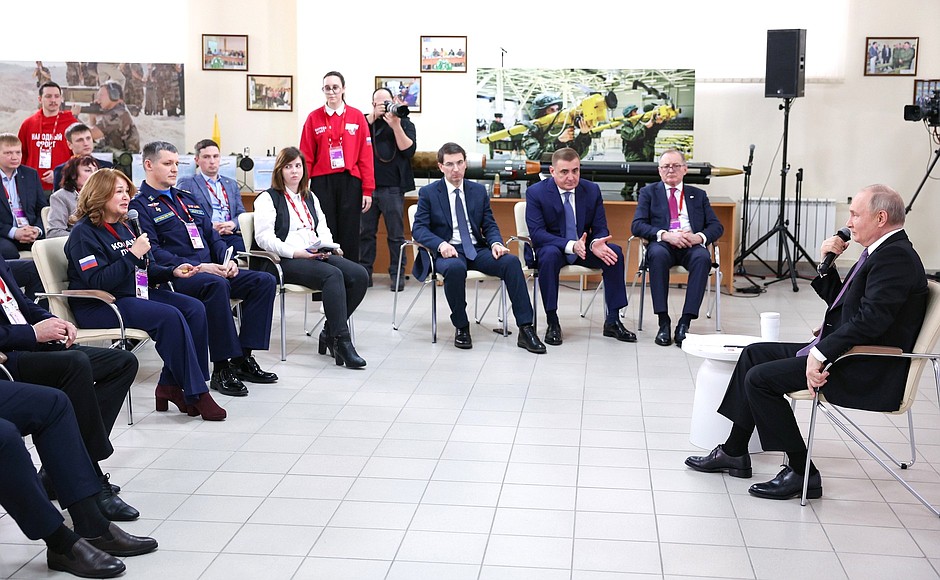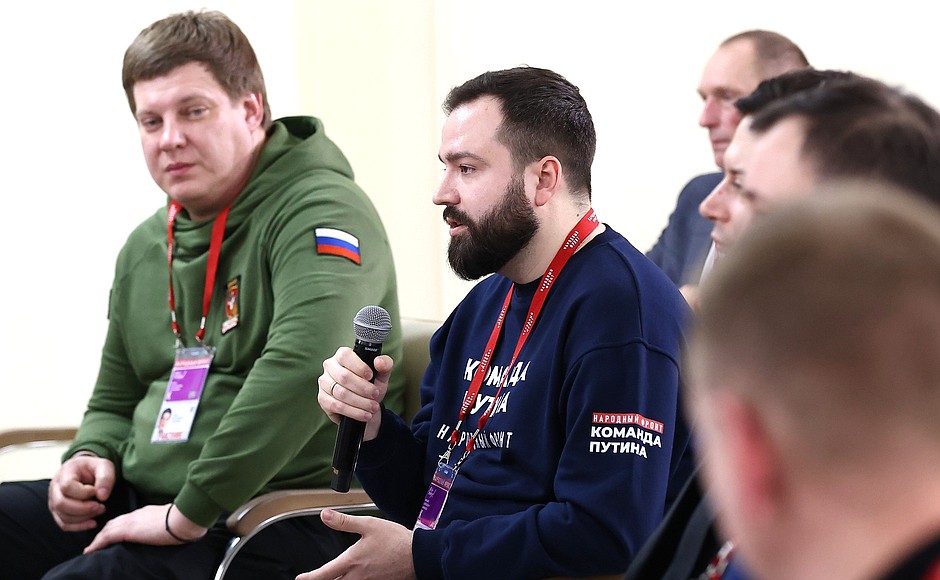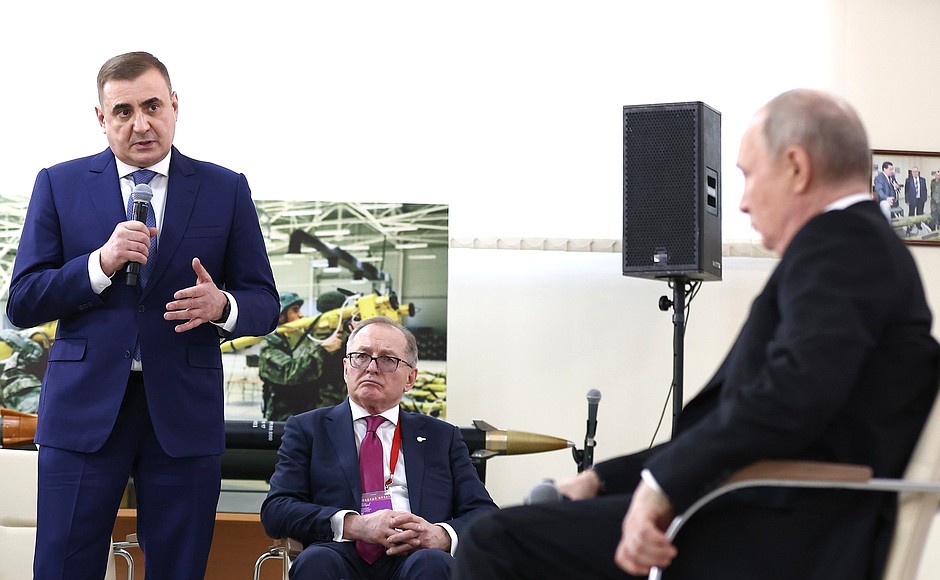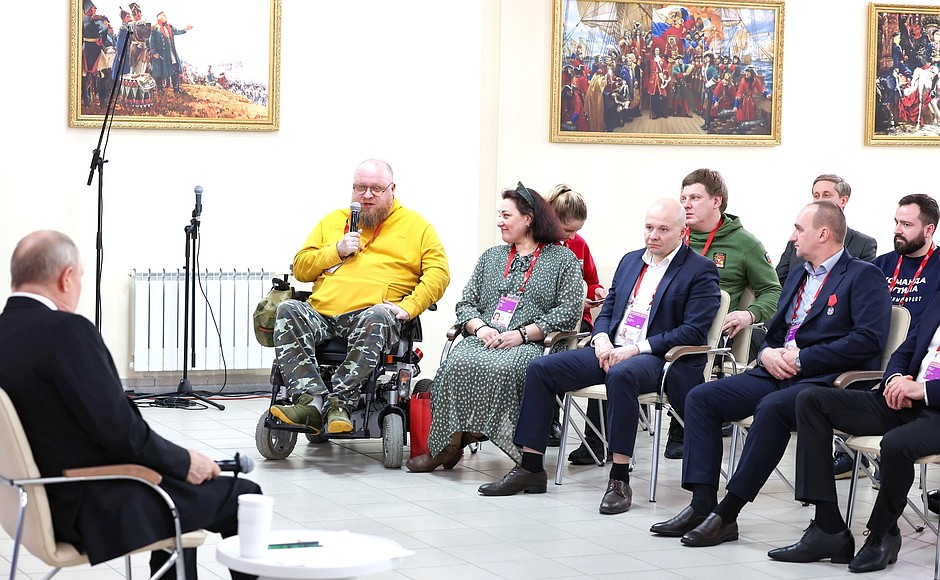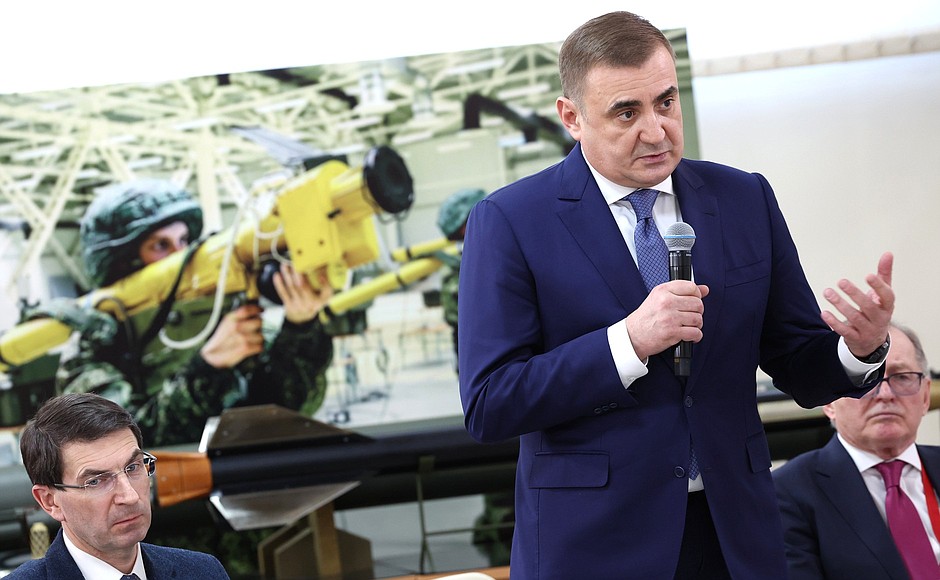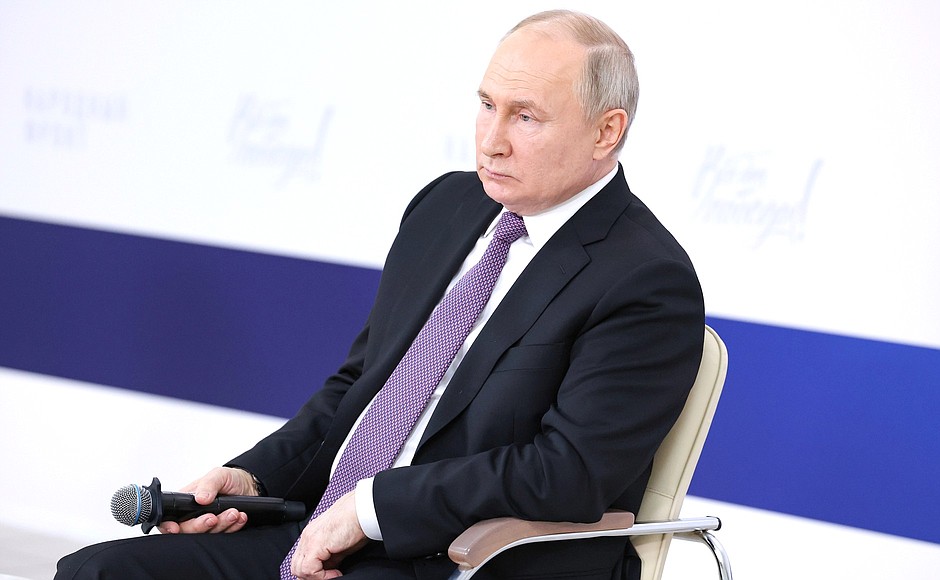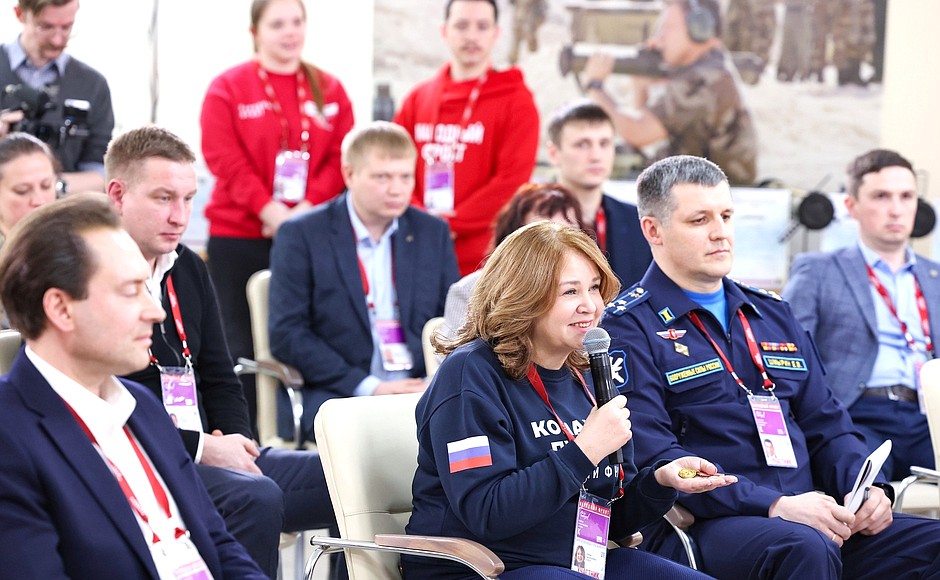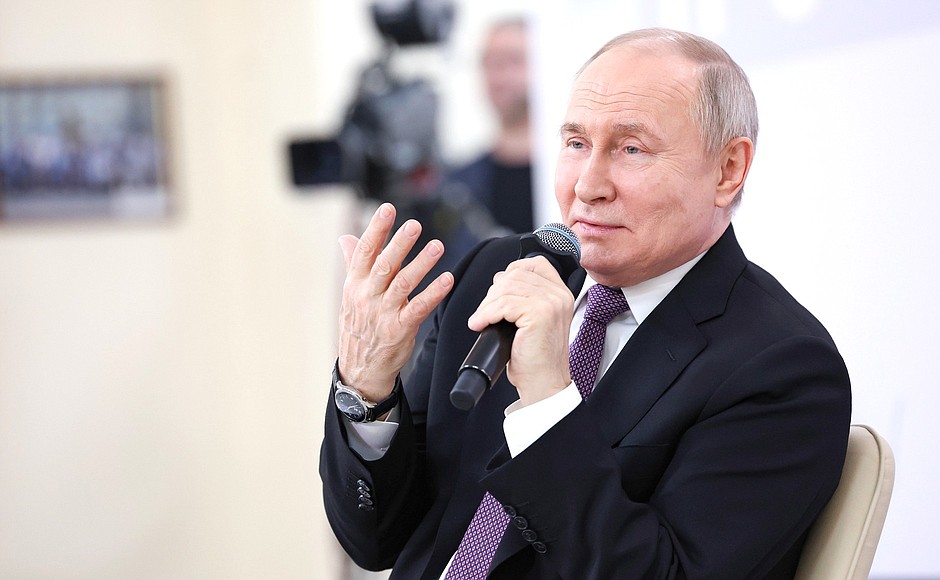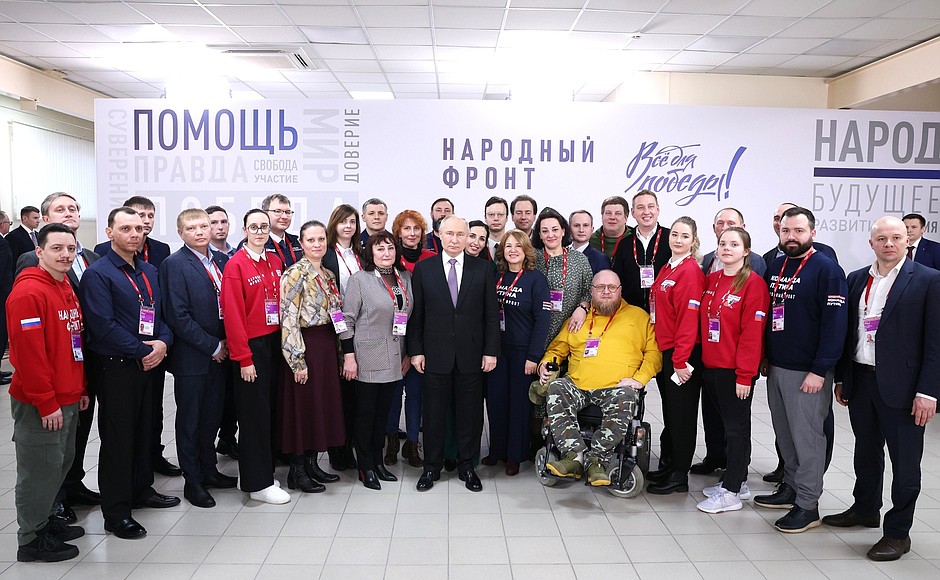The forum, organised by the Russian Popular Front brought together 600 representatives of various professions from all regions of Russia: workers and engineers of defence enterprises and other industries, employees of the scientific sector, NGOs, doctors, war correspondents, and volunteers. Within the framework of thematic sections, the participants discussed organising assistance for the special military operation.
* * *
Excerpts from transcript of meeting with activists participating in the Everything for Victory! forum
President of Russia Vladimir Putin: Friends, good afternoon.
As participants in today’s event, you know that a large forum is being held here today in Tula, one of the recognised historical centres of Russian arms manufacturing, on the initiative of the Russian Popular Front. The forum has brought together many people who have a link with the special military operation, whose lives and efforts have been aimed at supporting our guys at the front for the last 18 months.
See also
We tend to think mainly about those who sacrifice their lives and wellbeing to ensure Russia’s interests.
But it is impossible to achieve any success or victory in this great cause without varied, multifaceted support. Of course, the most important contribution to the overall work is made by the enterprises of the military-industrial complex, the defence industry. This is a large part of our industry, a large, huge “army” of people who work in this sphere.
Our 6,000 defence industry enterprises employ 3.5 million people. That’s a lot. But if we consider that, apart from these purely defence enterprises, another 10,000 enterprises are in one way or another connected with the defence industry, are their supply chain, their contractors to some extent, then you can imagine what this is, what kind of “army” this is.
In the last year and a half alone, 520,000 new jobs have been created in the defence industry, more than half a million jobs. But it is not that people showed up and got paid. Everyone works there, and they work hard. They work in two and, in some places, three shifts.
First, these are high-tech complexes, research organisations and design bureaus. The defence industry needs highly qualified engineers and workers because almost all of it is high-tech production.
To be successful on the battlefield today, it is necessary to respond quickly and adequately to what is happening there. Success is achieved by the side that can react quickly to the enemy’s means of destruction, reconnaissance and suppression. It should not just be quick in finding opportunities to suppress them but it should also create its own, more effective weapons. The side that does it quicker wins the battle. This is today’s approach to an armed struggle. Our defence industry is operating at a very good pace and with high quality.
Of course, if we compare modern NATO weapons with the arms of the late Soviet years, the latter are inferior in some specifications, but not all of them. And if we take our latest weapons, they are clearly superior to anything else. This is an obvious fact. I am referring to missile technology, armoured hardware and everything that is used on the battlefield.
I must say that we not only… that you not only – I am now addressing those who work at these plants – ensure high quality but you also meet the quantity needs. Armoured protection is the most important thing. We have increased the production of protective body armour for our fighters 10 times over and increased combat uniform manufacturing rates by 150 percent. Later, I will explain how many times (not percent) we have increased the production of armoured vehicles and other means of warfare, aircraft, and missile technology, including long-range precision missiles.
For almost the entire range of equipment, both quality and quantity are produced at very high rates, the rates the country needs. This is what our defence industry is doing. I know that people are doing even more than that. They work hard at plants, but if necessary, they go directly into the zone of hostilities and see how it all works in the field and then make adjustments. What can I say? If they work right on the frontline, they are real heroes.
In turn, the country is trying to provide the necessary resources for this work, primarily, funding. Defence industry workers know they are entitled to soft-term financing – 5.5 percent. Promstroybank gives them loans at this interest rate. Moreover, the Defence Ministry pays contractors almost 80 percent of the funding in advance for their work. This is very helpful for consistent operation in the defence sector. Heads of companies (one of them [Vladimir Filippov] is here) have received the right to provide incentives for those who work overtime. They can make decisions on paying incentive bonuses to hard workers.
We will continue to work on other social issues as well, primarily, increasing salaries, improving housing conditions, and addressing a broad range of other social issues, in a word, we will continue to focus on these areas.
Of course, the country does more than just focus on the defence industry. Everything our people are doing as they, in one way or another, help the front is extremely important. Healthcare professionals come first because whether they are on the front lines, in military hospitals, or in civilian public healthcare institutions, they are doing their best to support and help our troops, and to use the latest treatments in a timely manner. This is a crucial component of our overall success.
This is not to mention the volunteers who represent an extensive nationwide movement, or school students whom I recently discussed this with during a meeting. People of different ages, not just students, but older people as well, participate in this mass-scale effort. I’m not sure, but it looks like 99 percent of the country’s population is part of that effort. Everyone here is helping our servicemen on the frontline fight the neo-Nazis who committed a coup and took power in Ukraine several years ago. Their masters are pitting them against Russia and leveraging them as a tool in opposing Russia.
To reiterate, the overwhelming majority of our people stand with the army and the navy, with our soldiers, and this is what our success relies on. This is called unity. This is what our troops on the frontlines are leaning on. They feel this support which gives them strength to perform the most complex and dangerous mission assignments.
This is what I wanted to start with. We are still going to have a wide forum. Importantly, several years ago we introduced a badge of honour for good work, and yesterday I signed, perhaps it is out today – an Executive Order on instituting the Order For Valiant Labour.
As you are aware, the Soviet Union had orders that were awarded to people for labour valour, such as the Order of the Red Banner of Labour and many other awards. Some of them, I believe, need to be reinstated, especially now that there is so much demand for it, and we need to recognise people who, without exaggeration, achieve outstanding success in the cause to which they have devoted their lives. Today, the Tula-based enterprise SPLAV will receive the first such order.
This is what I wanted to say at the beginning. If you please, I will now listen to what you have to say, your proposals and concerns. Let’s discuss them and, if possible, provide a swift response.
Go ahead, please.
Anastasia Litvinova: Good afternoon, Mr President.
Good afternoon, colleagues.
My name is Anastasia Litvinova. I am the head of the metrology service at one of the leading defence plants in the Tula Region, Tulatochmash, where we all are now, and I am the chair of the Council of Young Specialists at the company.
The staff at the plant are working on the state defence order, making air defence equipment such as Pantsir surface-to-air missile and anti-aircraft artillery systems, and equipment for training bases. Tulatochmash also develops and mass-produces close-combat weapons, flamethrower systems, and training equipment, and provides on-site repair and maintenance services – this is what you mentioned – at military units in the areas where they are deployed. This is extremely important now.
We, the armorers of Tula, like our grandfathers and great-grandfathers during the Great Patriotic War, are guided by the motto ‘Everything for the front, everything for victory’. Now our challenge is to boost output and develop new products.
Our engineers work tirelessly to improve designs and introduce new technologies. Companies are deploying new facilities and training young personnel. We are making every effort to hasten the final victory of our Motherland over the enemy.
The high demand for our products, our companies’ products, has always inspired us, the armorers of Tula. It is important for us that by responsibly performing our work, we are repaying our debt to the Motherland. The management at our plants and our regional leaders highly appreciate our work. Our families are confident in the future, and knowing this motivates our teams to move forward.
I am sure that it is perfectly safe to add us – the country’s defence industry – to Russia’s allies that were once mentioned by Emperor Alexander III.
As you noted, in Soviet times we had a motivating practice of awarding orders to plants, which encouraged their employees to perform feats of labour. We are very grateful to you for instituting such an award with your Executive Order yesterday. Indeed, there are many enterprises in our region which deserve this honorary title. It fills us with professional pride and highlights the high level of cohesion of our work teams.
Thank you very much.
Vladimir Putin: You are welcome.
I think Alexander III also mentioned the Church among Russia’s allies but in Soviet times, they preferred to omit this. I think he spoke about the Army, the Navy and the Orthodox Church being the only Russia’s allies, but we should double check.
As for defence enterprises in general and those in Tula, in particular, of course we all understand that they are loaded with orders. But in addition to today’s requirements, I don’t know the situation at your plant that makes Pantsirs… There is very high demand for Pantsirs and I must say they are very popular on international arms markets. They are flying off the shelves – you just have to supply. I must say, strange as it may seem, last year we also supplied a decent amount of combat equipment on international markets – worth billions of dollars. But, of course, we need them today to protect civilian facilities, our infrastructure because we see how that Kiev regime is behaving – striking civilian facilities. We must protect them and the border. So there is urgent demand for your products.
But I would like to note that overall, the defence industry plants (strange as it may seem at first sight because of the need to deliver armaments to the frontline) have increased the manufacture of civilian products by almost 30 percent – 27 percent, to be precise, in the past year and a half. This is a very good figure.
This means that we will first load them up with orders for military products now and continue doing this in the future because we need to create reserves and replenish what was spent during hostilities. But, at the same time, we will support all undertakings linked with the development of civilian production.
So I have no doubts that such high-tech plants – and these are plants where the quality, level and culture of production are all high – will certainly have enough work and orders. I have no doubts about that.
I wish you success. Thank you very much.
Go ahead, please.
<…>
Kirill Bespalov: Good afternoon, Mr President!
My name is Kirill Bespalov. I am Russian. I was born and raised in Crimea, and I have always waited for Crimea to return home. I have known this would happen since I was a child. Thank you so much for this.
Naturally, when the special military operation began, like any other patriot and any Russian, I could not stand back. Unfortunately, I cannot go to the frontlines for health reasons. So I decided to help our men by transporting cargo in my car, which has a manual shift.
I was at the Kakhovka HPP on June 6 when it was detonated. I was driving with two volunteer girls, taking textbooks for children to school. This was Alexander Pushkin Day. We also took a lot of things for our men on the frontline, but on the way back we were swept up in the water and the car went under the water. The girls escaped through the car roof. They were driven back while I stayed in the car and even made a farewell video. I hoped people would find me and learn what I was doing. Suddenly, I saw our brave men from the special operations forces. They blocked the water with their vehicle and pulled me out. I am not small but they pulled me out. They couldn’t do it at first but eventually they tugged and pulled me out like a carrot out of the ground, as I tell everyone.
After a while, I was told that I was a “carrot” – actually a “combat carrot” since I’d been at the front. This is now my nickname or a call sign.
The Popular Front learned about my story. I got into a Popular Front stream and many concerned people in the country raised money to help me buy a new car. I have been driving it since then. There is a sticker on my car – “Popular Front. Humanitarian mission. Combat carrot.” At one checkpoint in the Kherson Region, fighters from the Caucasus stopped me and asked: “Why are you a carrot? You look more like a cabbage.” I replied: “This is the carrot I turned into.”
Now I continue working, driving with my combat friend. Her name is Nastya Pinchuk. She is from the Call of the Heart organisation. She is a genuine Russian woman, an example for everyone to follow. She is sacrificing everything for victory, for the Motherland.
Why am I telling you all this? I don’t have any requests. I don’t need anything. I simply wanted to thank you very much for raising the country from its knees. You should know that we are on the same team with you here in Crimea. If we have to make it to Washington, we’ll make it.
Thank you very much.
Vladimir Putin: You know, Kirill, you have thanked me, and I would like to respond in kind. This is what I want to say. If I were not sure that the overwhelming majority of our citizens, both in Crimea and throughout our huge Motherland, think like you do, I would not have done anything in Crimea. But I was sure that people in Crimea and the whole of Russia wanted reunification. Likewise, the overwhelming majority of people in our country want to help Donbass. They do not want to surrender people to those neo-Nazis.
It is a painful subject, yet I will say it now. You know what happened after our units withdrew from the Kherson Region, what those bastards did there. Only neo-Nazis can do this. This is the point. This is who we are dealing with.
Nothing would have happened if not for that general mood in society. We are doing what people expect us to do.
Kirill mentioned patriotism just now. Attitudes towards patriotism change with time, and there were different explanations. So-called liberals… I say “so-called” because liberalism is not something bad – there are many different trends in liberalism – but its adherents long ago started to define patriotism as an umbrella for villains. Why is that? Because some people use love of their Motherland, patriotism, as a cover for doing whatever they want. There are such people indeed.
Of course, there are people who overdo things. But this cannot affect the idea of love of your Motherland. This is important. This is what we must be aware of. So, those who try to smear love of our Motherland either do not understand what they are doing or do it deliberately on orders from our enemies. Love of your Motherland is a very positive feeling.
Why do we think about our home cities and families when we speak about Motherland, patriotism, and love of your country? Why do we always speak about this? And why do we place all of this on the same level? It is very simple.
Look, if we had failed to act, if we had refrained from defending our people in Donbass, and now in the Kherson and Zaporozhye regions too, in Novorossiya, if we had not done anything, if we had not helped people in Crimea and abandoned them, what would our country have turned into? It would have turned into a dilapidated nation unable to provide for its own needs, a country nobody needs in fact. Considering our rich natural resources, outsiders would condescendingly pat us on our back and send us rotten potatoes as humanitarian aid while constantly trying to chip away at our resources.
We have seen it all. I have been following these developments for two decades now. They sugar-coat what they say and all you hear is honey, but deep inside all they have on their minds is how to chip away at what we have. They want to frame the global economy in a way that deprives us of our competitive advantage and takes as much as possible from us considering the leverage they have in defence and politics.
But if leaving this dilapidated nation that nobody needs to future generations is not what we want, if we do not want to doom our children to live with the feeling that they are second-rate people, then, of course, there is no way we can abandon our people in Crimea, in Novorossiya or in Donbass. We must make our country self-sufficient. This is what sovereignty is all about. It is also about what we do together to build a stronger economy in general so that the whole world and, most importantly, we as a nation understand that we can provide for its own needs.
Look, they have an economy… Indeed, they will recover since the fundamentals in the United States and Europe are quite good. So, they will rise again. But today, the major economies are in the red, while we are in the black.
It is not a question of where we are today. What matters here is that we have proven, both to ourselves and to everyone around us, that we are a self-sufficient nation. They thought our financial system would crumble within three months while the economy would not last more than six, that companies would close down. No. As I have said, half a million people have joined your sector over the past eighteen months alone. The same is happening in many other sectors, including in high technology. We are becoming a self-sufficient country in terms of the economy, finance, defence and security, as well as in the social sector.
We are discussing housing right now. But we are doing all this, all that is happening. We have hit record-high housing construction volumes by building over 110 million square meters of housing. This has never happened before, but we did it.
If we think about the future, and what country our children will live in, what are we going to leave them, it all forms a single whole: the love of your family, your children, parents, your native region or town, and the country in general. This is what patriotism is all about. So, what I wanted to say is that we are moving in the right direction.
Thank you very much.
To be continued.
